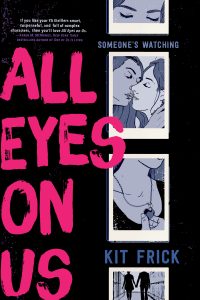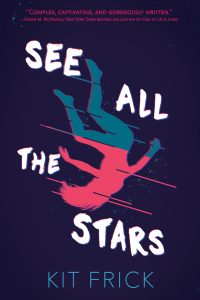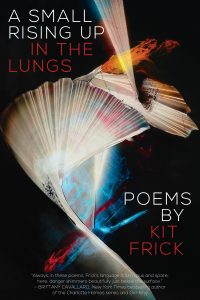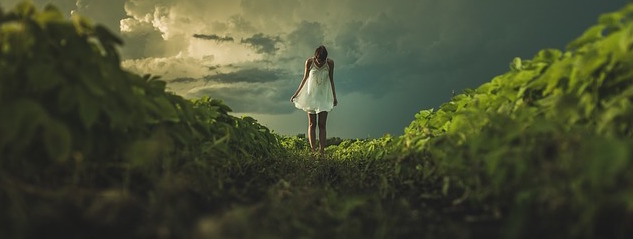Young Adult Novels Don’t Pull Any Punches
Young Adult Novels aren’t just for kids. While the protagonists in YA are typically in the 13-18 year-old range, readers can be any age. YA Thriller Writer Kit Frick talks about writing for teens, her work as a poet and editor, and wrapping up her third book.
Don’t miss Kit’s Debut Author interview from last year on my blog. Click the link here to read.
Welcome Kit!
The Author
 Kit Frick is a novelist, poet, and MacDowell Colony fellow from Pittsburgh, PA. She studied creative writing at Sarah Lawrence College and received her MFA from Syracuse University. When she isn’t putting complicated characters in impossible situations, Kit edits poetry and literary fiction for a small press, edits for private clients, and mentors emerging writers through Pitch Wars.
Kit Frick is a novelist, poet, and MacDowell Colony fellow from Pittsburgh, PA. She studied creative writing at Sarah Lawrence College and received her MFA from Syracuse University. When she isn’t putting complicated characters in impossible situations, Kit edits poetry and literary fiction for a small press, edits for private clients, and mentors emerging writers through Pitch Wars.
She is the author of the young adult novels See All the Stars and All Eyes on Us, out now from Simon & Schuster / Margaret K. McElderry Books, as well as the poetry collection A Small Rising Up in the Lungs from New American Press. A third YA thriller will follow in 2020.
To learn more about Kit, click on her name, photo, or any of the following links: Twitter, Instagram, Pinterest, Facebook, Goodreads, Goodreads Author Page, Amazon Author Page and sign up for her newsletter here.
The Books
 All Eyes on Us
All Eyes on Us
When an anonymous texter threatens Amanda and Rosalie, two teens with very different lives in small town West Virginia, the girls become unlikely allies in a fight to unmask their stalker before Private Number spills their secrets and uproots their lives.
A tense thriller for fans of Pretty Little Liars, People Like Us, and The Miseducation of Cameron Post.
To buy the book, click on any of the links: Barnes & Noble, Amazon, IndieBound, Books-A-Million, and Book Depository.
 See All the Stars
See All the Stars
A story about first love and big loss and even bigger guilt—and an epic breakup between best friends. The story takes place in two timelines that alternate between the past and present as Ellory tries to focus on her future.
It’s a contemporary suspense about accepting responsibility for the things you can’t change and then learning to move on.
To buy the book, click on any of the links: Barnes & Noble, Amazon, IndieBound, Books-A-Million, and Book Depository.
The Interview
What drew you to writing Young Adult Novels? Specifically, Thrillers. What is it about the 13-18 year old protagonist and reader that interests you?
Thanks for having me, Elena! That time in my life—adolescence—still feels easily accessible, even though I’m decades past it now. Everything was so emotionally immediate and urgent and pivotal at fifteen, sixteen, seventeen … Those emotional memories stick!
So writing about teens, for teens, was a natural fit for me. In terms of the thriller genre, I love a good mystery with twists and turns and complicated characters.
I have fun developing plot layers and placing my characters in heightened, thrilling situations. Everything already feels like it’s life-or-death when you’re a teen, so as a writer, making those stakes literal feels right and true.
“No one sails through their teen years entirely unscathed.”
Writing for teens doesn’t mean you pull any punches in your work. Your Young Adult Novels cover bullying, homophobia, abusive conversion therapy, and alcoholism, along with the other challenges of surviving the teenage years. How do you go about putting such complex and controversial subjects in your novels? Do you believe it’s different than writing for “adults” or is the difference solely in the ages of your characters?
Adolescence can be a dark time, even for teens who have a comparatively light load to bear in terms of marginalizations and level of privilege. No one sails through their teen years entirely unscathed. So while my books are far from being “issue” books in terms of their treatment of the challenges teens face, I also don’t shy away from the real darkness in my characters’ lives.
In terms of writing dark subject matter for a teen audience, it’s been my experience thus far that there are no hard-and-fast publishing rules about what you can’t do in YA, for which I’m very thankful. I am, however, constantly aware of my readership when I’m writing about something like homophobia or mental illness or bullying.
If a character calls someone “crazy” or expresses prejudice, you’d better believe they’re not just going to get away with it on the page. This isn’t because I see my role as an educator; teens will absolutely sniff out anything that feels didactic. But rather because teen readers are smart and socially aware and not going to stand for that kind of lazy approach—and nor are the teachers and librarians and booksellers that I hope will be getting my books into their hands.
Your first novel, See All the Stars, garnered a lot of critical and popular buzz. What was it like writing a second novel with such a high bar? Did it make you more confident? or did it make the pressure even higher to match the success?
Writing a second novel—and putting it out into the world—is definitely a different beast from publishing a debut! But I was in the fortunate position of having not only drafted All Eyes on Us before See All the Stars released but having gone through all the stages of revision with my editor as well. All Eyes on Us was headed to page proofs when See All the Stars hit shelves last August, so I was able to bask in my little pre-publication bubble for much of the process!
I do think I have a better grasp of the landscape this time around, after having gone through this once before. Mostly that’s been a good thing—I know what to expect and what not to expect and what the timeframe is like and what is and probably isn’t worth my time and energy.
How has your background as a poet and editor shaped you as a novelist?
 In some ways, I’m not sure it has. Creatively, the process of writing a novel and the process of writing a poem is very different for me. Similarly, the process of editing the work of other writers is very different—and often so much clearer!—than the process of sitting down to revise my own writing.
In some ways, I’m not sure it has. Creatively, the process of writing a novel and the process of writing a poem is very different for me. Similarly, the process of editing the work of other writers is very different—and often so much clearer!—than the process of sitting down to revise my own writing.
But that said, the discipline required to complete my MFA (in poetry) and the experience I gained from publishing poems and poetry chapbooks, as well as my experience working in publishing as both a small press editor at Black Lawrence Press and as an independent editor at Copper Lantern Studio did help prepare me for the publishing/business side of the writing process, which has been valuable as I’ve put my own first books of both fiction and poetry into the world over the past year.
“I now understand quite a few things about seasons and publicity and marketing that are making this second book’s release quite a bit less stressful!”
Now that you are more adept at wearing both the creative and the business side hats of being an author, what do you wish you had known when your debut novel hit the shelves?
I learned a lot about what it means to have a summer book—i.e. a book published during the summer publishing season of May/June through August. Since my book came out at the end of that window, media attention soon turned to fall books, naturally.
That seems like common sense, but I had unrealistic expectations of publicity hits continuing to roll in for See All the Stars far beyond its August 14 publication date. Ah, Baby Kit. Of course, All Eyes on Us is releasing toward the beginning of that summer season, so things are a bit different this time around, but I now understand quite a few things about seasons and publicity and marketing that are making this second book’s release quite a bit less stressful!
What are you working on now?
I’m ecstatic to be wrapping up revisions on my third novel, which will release in summer 2020 from S&S/McElderry. In fact, by the time this interview posts, hopefully I will have turned it in! I can’t say a lot about it yet (soon!) but I’m calling it my “YA Rebecca in the Hamptons” book.
It’s also a thriller, it’s loosely inspired by Daphne du Maurier’s Rebecca, it features a teen podcaster, and it’s listed under Windermere, which is title it sold with, if you want to find it on Goodreads!
“. . . don’t call yourself “aspiring.” Just do it.”
Final words of wisdom:
Read widely in your age category and genre. Get to know the playing field. Seek out trusted readers for your work and listen to their feedback. Know that you don’t have to take every piece of feedback. Revise. Revise more. Remember that publishing is not a meritocracy.
There’s a lot of luck and timing involved in getting a book published, and while both of those factors are beyond your control, understanding that they play a key role can help put your experience and others’ in perspective. Also, don’t call yourself “aspiring.” Just do it.
Great advice! Thanks for hanging out with us. I love reading Young Adult Novels Looking forward to following your career!
Header Photo by Pixabay, click the link here for more information.


